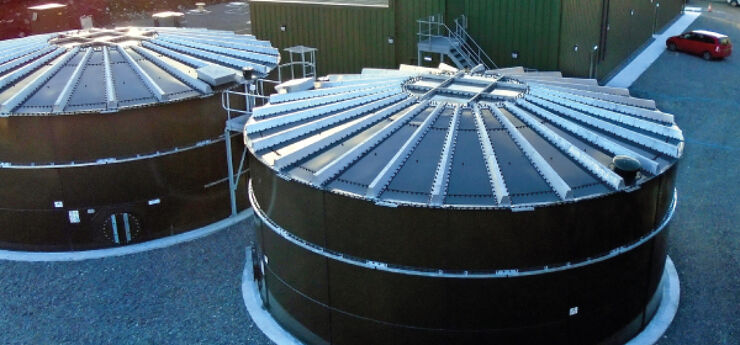
National water and wastewater utility Scottish Water has recently procured a state-of-the-art modular water treatment works on a remote island site using NEC contracts. The new 1.3Ml/day water treatment works at Lochmaddy in North Uist, Outer Hebrides, was installed on site in just 4 weeks.
Scottish Water awarded the contract for the work to its local framework contractor Ross-shire Engineering under an NEC3 Engineering and Construction Contract Option C (target cost with activity schedule) in May 2017. The project involved design and construction of a new raw-water abstraction pump station and raw-water main from Loch Fada, a new modular nanofiltration water treatment works to replace two existing treatment works at Lochmaddy and Bayhead, two new clear water storage tanks and various water main upgrades to connect with the Lochmaddy and Bayhead distribution systems.
Ross-shire Engineering designed and built the whole two-storey, 870m2 modular water treatment building in its factory near Inverness and delivered the 12 modules to site by road and ferry in July 2018. It subcontracted the civil engineering works to local contractor MacInnes Bros under an NEC3 Engineering and Construction Subcontract (ECS) option A (priced contract with activity schedule).
The first clean water from the plant was delivered into supply in April 2019.
Collaboration savings
According to Scottish Water project manager Anoushka Ainslie-McAlpine, ‘Our original plans for the water treatment works were for a dissolved-air-flotation and rapid-gravity-filtration (DAF/RGF) plant built in situ, for which the estimated cost and programme were £23.5 million and 2 years 6 months respectively.
‘However, working collaboratively in line with the NEC obligation to act “in a spirit of mutual trust and co-operation”, Ross-shire Engineering proposed various changes to the contract scope to cut the capital cost and programme as well as reduce operating cost, mitigate project risk and limit construction impact.
‘Of particular benefit was changing the treatment technology from DAF/RGF to nanofiltration membranes, and to use an offsite modular build approach for the whole treatment building rather than just the plant within it.’
She says the move to complete offsite modular construction allowed the civil engineering works to be completed in parallel with the manufacturing of the process plant.
‘Along with the change in process technology, this shortened the programme by 11 months and reduced the capital cost by £11.4 million.’
Contract flexibility
Ainslie-McAlpine adds that a further benefit of NEC was its flexibility to deal with an unusual procurement arrangement resulting from the change in process technology.
‘Scottish Water already had a lump-sum framework agreement in place with Ross-shire Engineering for the supply of nanofiltration plant. To ring-fence the lump-sum element within the ECC Option C target cost contract, we stated in the schedule of cost components it would be paid as if it was a subcontract cost – even though it was the same supplier. The benefit of this to Scottish Water was that there were no working area overheads or people-cost uplifts to cover the overheads associated with offsite modular element.’
Ross-shire Engineering commercial director Steven McLachlan says the change-management processes within NEC also proved useful at the outset when it became apparent that the geology of the original site was too variable to be suitable. ‘Through early engagement of the civil engineering subcontractor and further ground investigation, we soon found a more suitable site underlain by uniform rock strata.
‘Working collaboratively, the project team then determined an optimum excavation depth for the water treatment building to provide sufficient fill materials for the access roads and aggregates for the foundation concrete. Of the 42,000t of blasted rock, approximately 31,000t was crushed and processed on site for re-use on the project, substantially reducing vehicle movements.’




